Business Essential Study and Employment Skills Audit Report
VerifiedAdded on 2024/04/25
|11
|3065
|157
AI Summary
This report reflects on a group exercise focusing on employment skills development through teamwork. It evaluates key skills like teamwork, communication, research, planning, decision-making, problem-solving, and more.
Contribute Materials
Your contribution can guide someone’s learning journey. Share your
documents today.
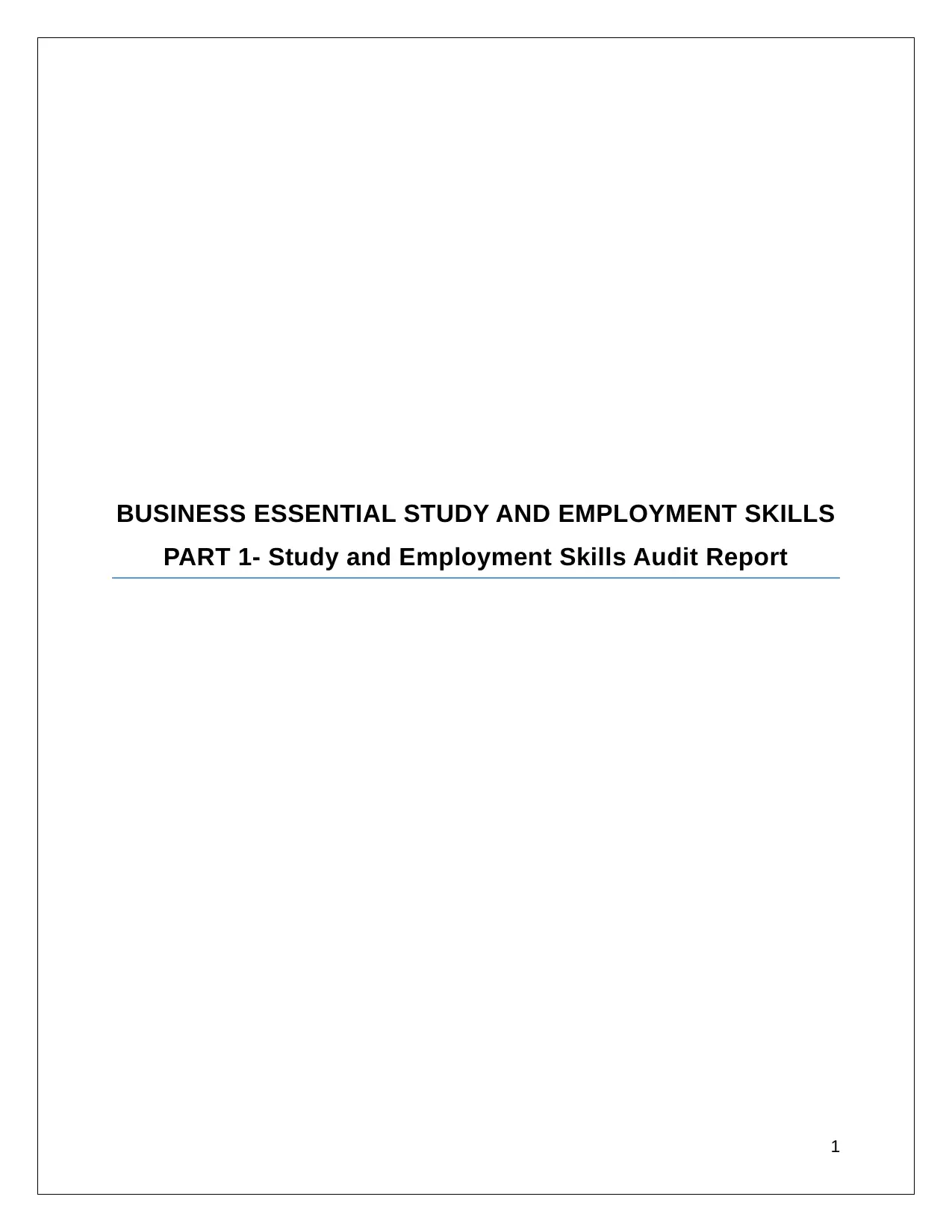
BUSINESS ESSENTIAL STUDY AND EMPLOYMENT SKILLS
PART 1- Study and Employment Skills Audit Report
1
PART 1- Study and Employment Skills Audit Report
1
Secure Best Marks with AI Grader
Need help grading? Try our AI Grader for instant feedback on your assignments.
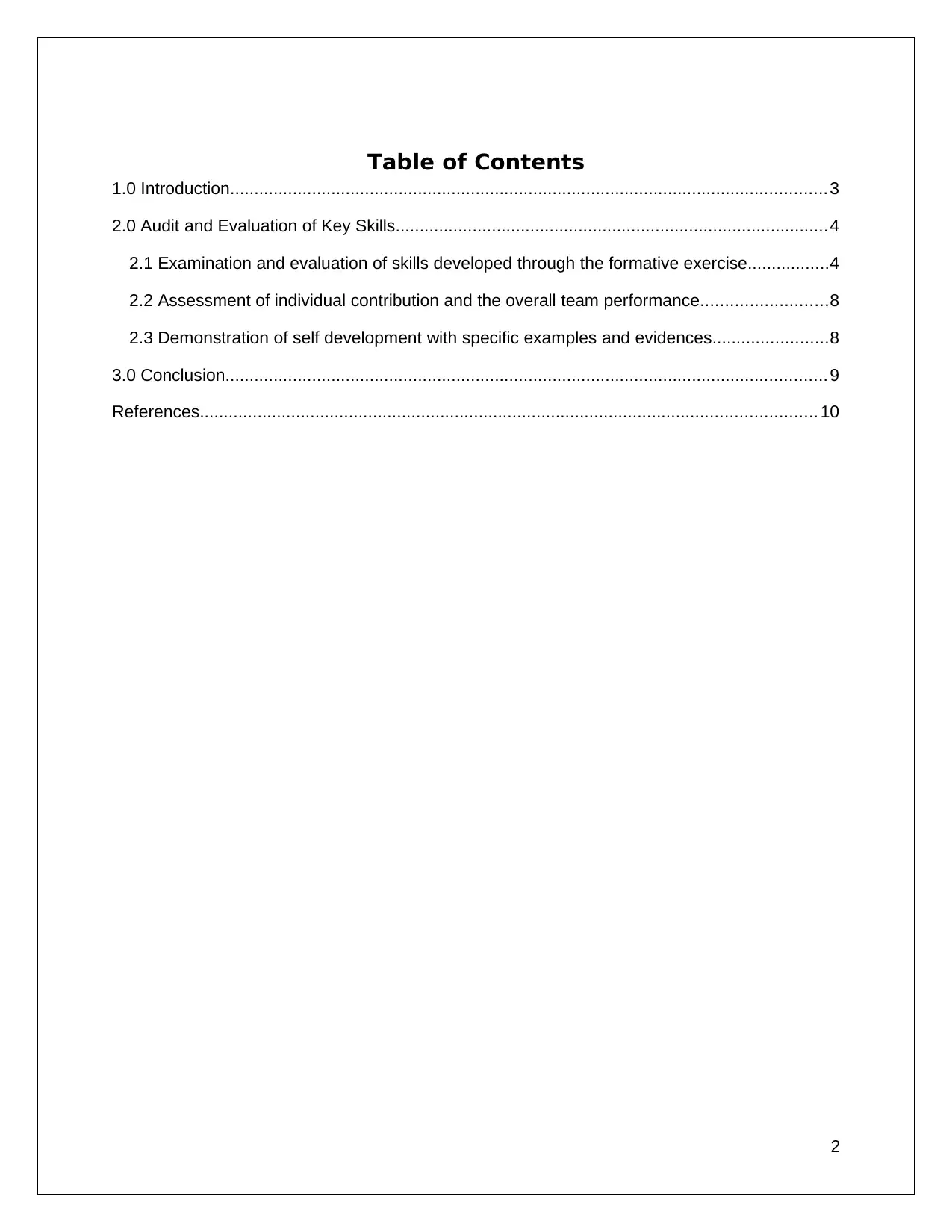
Table of Contents
1.0 Introduction............................................................................................................................ 3
2.0 Audit and Evaluation of Key Skills..........................................................................................4
2.1 Examination and evaluation of skills developed through the formative exercise.................4
2.2 Assessment of individual contribution and the overall team performance..........................8
2.3 Demonstration of self development with specific examples and evidences........................8
3.0 Conclusion............................................................................................................................. 9
References................................................................................................................................ 10
2
1.0 Introduction............................................................................................................................ 3
2.0 Audit and Evaluation of Key Skills..........................................................................................4
2.1 Examination and evaluation of skills developed through the formative exercise.................4
2.2 Assessment of individual contribution and the overall team performance..........................8
2.3 Demonstration of self development with specific examples and evidences........................8
3.0 Conclusion............................................................................................................................. 9
References................................................................................................................................ 10
2
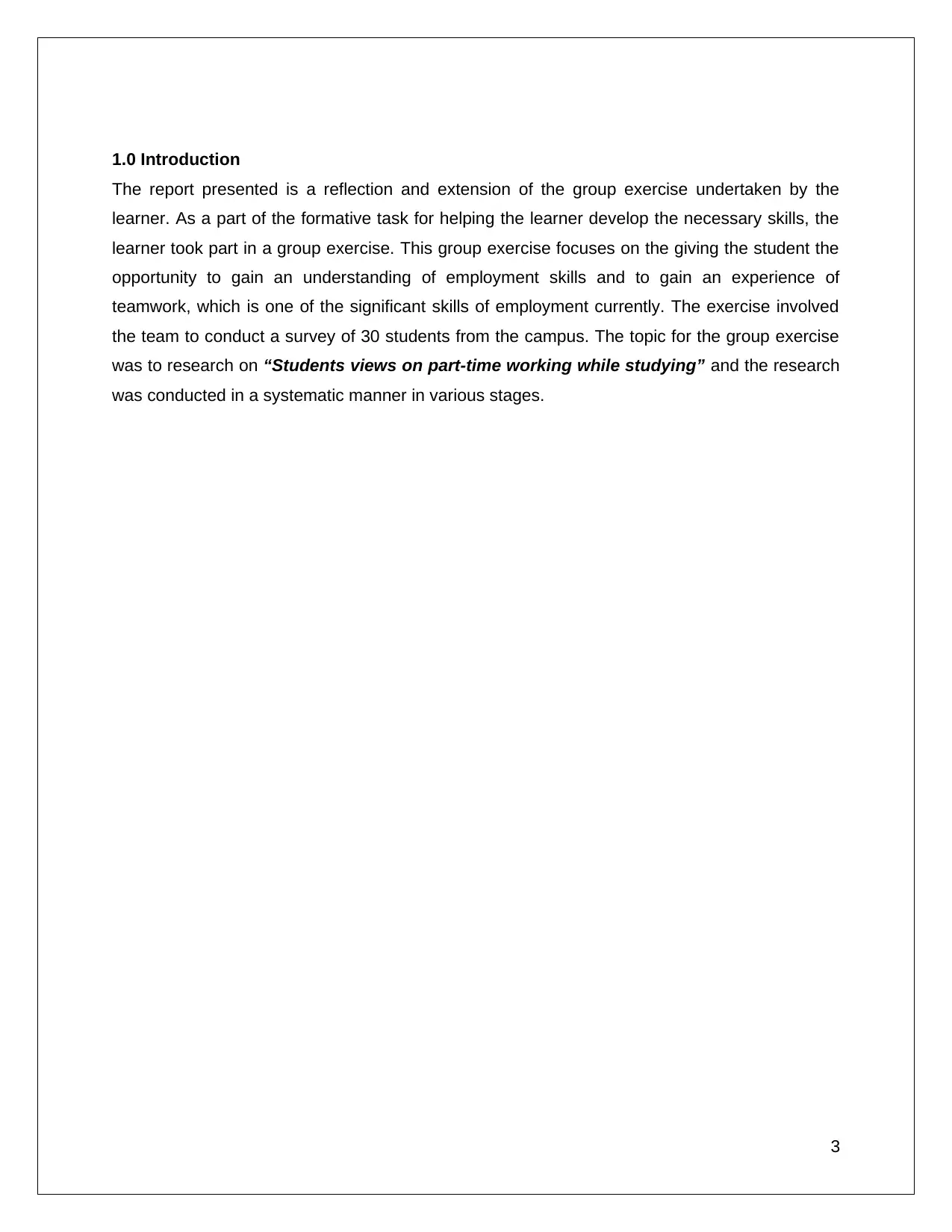
1.0 Introduction
The report presented is a reflection and extension of the group exercise undertaken by the
learner. As a part of the formative task for helping the learner develop the necessary skills, the
learner took part in a group exercise. This group exercise focuses on the giving the student the
opportunity to gain an understanding of employment skills and to gain an experience of
teamwork, which is one of the significant skills of employment currently. The exercise involved
the team to conduct a survey of 30 students from the campus. The topic for the group exercise
was to research on “Students views on part-time working while studying” and the research
was conducted in a systematic manner in various stages.
3
The report presented is a reflection and extension of the group exercise undertaken by the
learner. As a part of the formative task for helping the learner develop the necessary skills, the
learner took part in a group exercise. This group exercise focuses on the giving the student the
opportunity to gain an understanding of employment skills and to gain an experience of
teamwork, which is one of the significant skills of employment currently. The exercise involved
the team to conduct a survey of 30 students from the campus. The topic for the group exercise
was to research on “Students views on part-time working while studying” and the research
was conducted in a systematic manner in various stages.
3
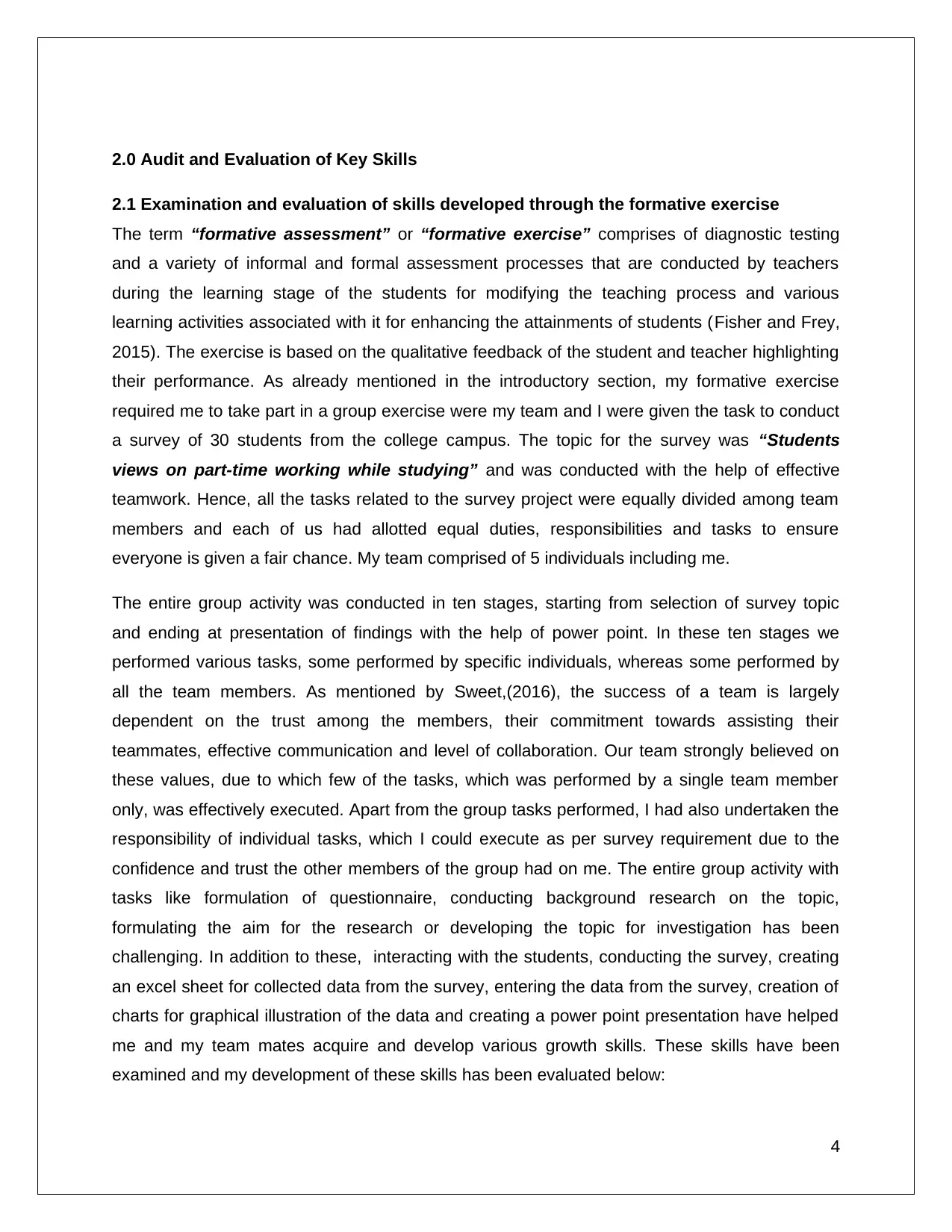
2.0 Audit and Evaluation of Key Skills
2.1 Examination and evaluation of skills developed through the formative exercise
The term “formative assessment” or “formative exercise” comprises of diagnostic testing
and a variety of informal and formal assessment processes that are conducted by teachers
during the learning stage of the students for modifying the teaching process and various
learning activities associated with it for enhancing the attainments of students (Fisher and Frey,
2015). The exercise is based on the qualitative feedback of the student and teacher highlighting
their performance. As already mentioned in the introductory section, my formative exercise
required me to take part in a group exercise were my team and I were given the task to conduct
a survey of 30 students from the college campus. The topic for the survey was “Students
views on part-time working while studying” and was conducted with the help of effective
teamwork. Hence, all the tasks related to the survey project were equally divided among team
members and each of us had allotted equal duties, responsibilities and tasks to ensure
everyone is given a fair chance. My team comprised of 5 individuals including me.
The entire group activity was conducted in ten stages, starting from selection of survey topic
and ending at presentation of findings with the help of power point. In these ten stages we
performed various tasks, some performed by specific individuals, whereas some performed by
all the team members. As mentioned by Sweet,(2016), the success of a team is largely
dependent on the trust among the members, their commitment towards assisting their
teammates, effective communication and level of collaboration. Our team strongly believed on
these values, due to which few of the tasks, which was performed by a single team member
only, was effectively executed. Apart from the group tasks performed, I had also undertaken the
responsibility of individual tasks, which I could execute as per survey requirement due to the
confidence and trust the other members of the group had on me. The entire group activity with
tasks like formulation of questionnaire, conducting background research on the topic,
formulating the aim for the research or developing the topic for investigation has been
challenging. In addition to these, interacting with the students, conducting the survey, creating
an excel sheet for collected data from the survey, entering the data from the survey, creation of
charts for graphical illustration of the data and creating a power point presentation have helped
me and my team mates acquire and develop various growth skills. These skills have been
examined and my development of these skills has been evaluated below:
4
2.1 Examination and evaluation of skills developed through the formative exercise
The term “formative assessment” or “formative exercise” comprises of diagnostic testing
and a variety of informal and formal assessment processes that are conducted by teachers
during the learning stage of the students for modifying the teaching process and various
learning activities associated with it for enhancing the attainments of students (Fisher and Frey,
2015). The exercise is based on the qualitative feedback of the student and teacher highlighting
their performance. As already mentioned in the introductory section, my formative exercise
required me to take part in a group exercise were my team and I were given the task to conduct
a survey of 30 students from the college campus. The topic for the survey was “Students
views on part-time working while studying” and was conducted with the help of effective
teamwork. Hence, all the tasks related to the survey project were equally divided among team
members and each of us had allotted equal duties, responsibilities and tasks to ensure
everyone is given a fair chance. My team comprised of 5 individuals including me.
The entire group activity was conducted in ten stages, starting from selection of survey topic
and ending at presentation of findings with the help of power point. In these ten stages we
performed various tasks, some performed by specific individuals, whereas some performed by
all the team members. As mentioned by Sweet,(2016), the success of a team is largely
dependent on the trust among the members, their commitment towards assisting their
teammates, effective communication and level of collaboration. Our team strongly believed on
these values, due to which few of the tasks, which was performed by a single team member
only, was effectively executed. Apart from the group tasks performed, I had also undertaken the
responsibility of individual tasks, which I could execute as per survey requirement due to the
confidence and trust the other members of the group had on me. The entire group activity with
tasks like formulation of questionnaire, conducting background research on the topic,
formulating the aim for the research or developing the topic for investigation has been
challenging. In addition to these, interacting with the students, conducting the survey, creating
an excel sheet for collected data from the survey, entering the data from the survey, creation of
charts for graphical illustration of the data and creating a power point presentation have helped
me and my team mates acquire and develop various growth skills. These skills have been
examined and my development of these skills has been evaluated below:
4
Secure Best Marks with AI Grader
Need help grading? Try our AI Grader for instant feedback on your assignments.
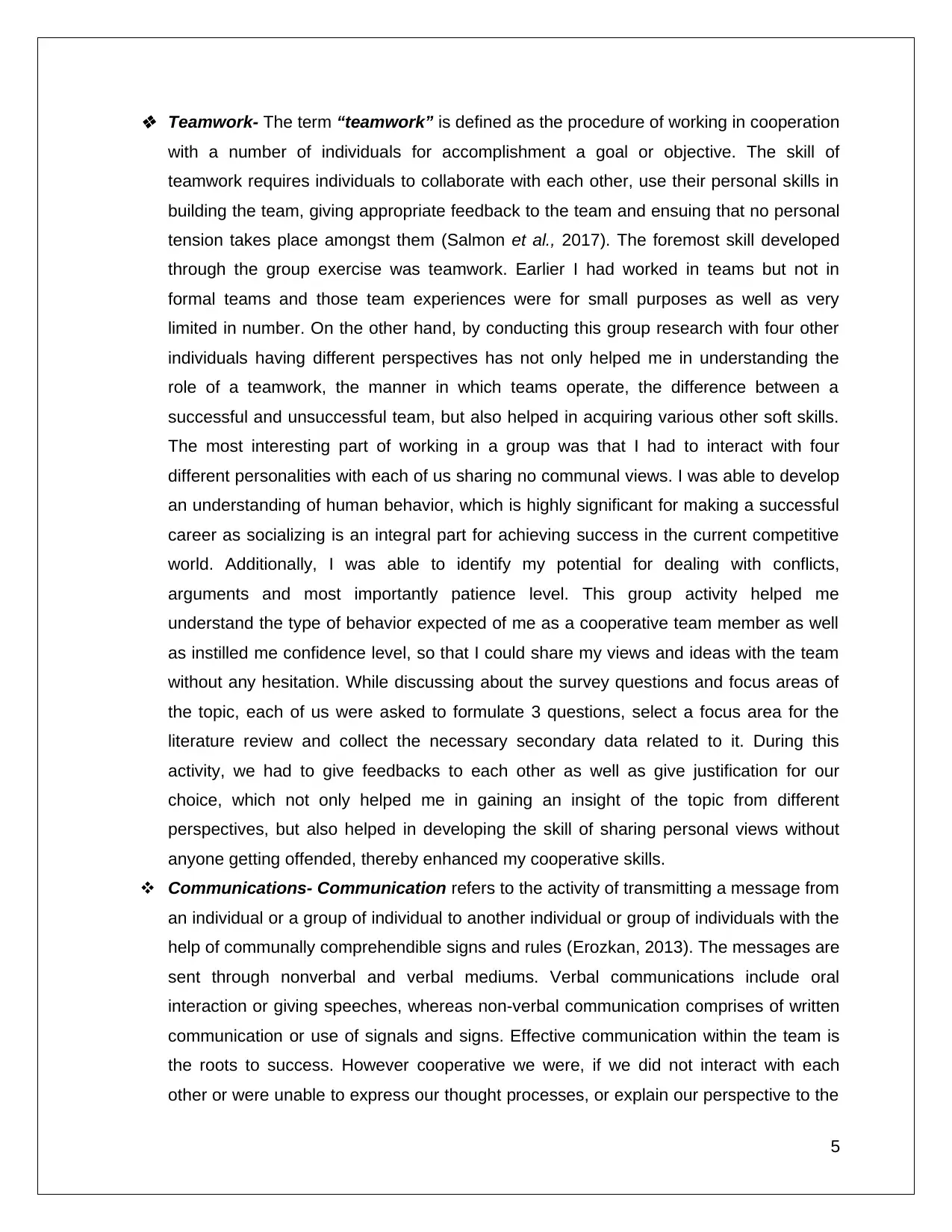
Teamwork- The term “teamwork” is defined as the procedure of working in cooperation
with a number of individuals for accomplishment a goal or objective. The skill of
teamwork requires individuals to collaborate with each other, use their personal skills in
building the team, giving appropriate feedback to the team and ensuing that no personal
tension takes place amongst them (Salmon et al., 2017). The foremost skill developed
through the group exercise was teamwork. Earlier I had worked in teams but not in
formal teams and those team experiences were for small purposes as well as very
limited in number. On the other hand, by conducting this group research with four other
individuals having different perspectives has not only helped me in understanding the
role of a teamwork, the manner in which teams operate, the difference between a
successful and unsuccessful team, but also helped in acquiring various other soft skills.
The most interesting part of working in a group was that I had to interact with four
different personalities with each of us sharing no communal views. I was able to develop
an understanding of human behavior, which is highly significant for making a successful
career as socializing is an integral part for achieving success in the current competitive
world. Additionally, I was able to identify my potential for dealing with conflicts,
arguments and most importantly patience level. This group activity helped me
understand the type of behavior expected of me as a cooperative team member as well
as instilled me confidence level, so that I could share my views and ideas with the team
without any hesitation. While discussing about the survey questions and focus areas of
the topic, each of us were asked to formulate 3 questions, select a focus area for the
literature review and collect the necessary secondary data related to it. During this
activity, we had to give feedbacks to each other as well as give justification for our
choice, which not only helped me in gaining an insight of the topic from different
perspectives, but also helped in developing the skill of sharing personal views without
anyone getting offended, thereby enhanced my cooperative skills.
Communications- Communication refers to the activity of transmitting a message from
an individual or a group of individual to another individual or group of individuals with the
help of communally comprehendible signs and rules (Erozkan, 2013). The messages are
sent through nonverbal and verbal mediums. Verbal communications include oral
interaction or giving speeches, whereas non-verbal communication comprises of written
communication or use of signals and signs. Effective communication within the team is
the roots to success. However cooperative we were, if we did not interact with each
other or were unable to express our thought processes, or explain our perspective to the
5
with a number of individuals for accomplishment a goal or objective. The skill of
teamwork requires individuals to collaborate with each other, use their personal skills in
building the team, giving appropriate feedback to the team and ensuing that no personal
tension takes place amongst them (Salmon et al., 2017). The foremost skill developed
through the group exercise was teamwork. Earlier I had worked in teams but not in
formal teams and those team experiences were for small purposes as well as very
limited in number. On the other hand, by conducting this group research with four other
individuals having different perspectives has not only helped me in understanding the
role of a teamwork, the manner in which teams operate, the difference between a
successful and unsuccessful team, but also helped in acquiring various other soft skills.
The most interesting part of working in a group was that I had to interact with four
different personalities with each of us sharing no communal views. I was able to develop
an understanding of human behavior, which is highly significant for making a successful
career as socializing is an integral part for achieving success in the current competitive
world. Additionally, I was able to identify my potential for dealing with conflicts,
arguments and most importantly patience level. This group activity helped me
understand the type of behavior expected of me as a cooperative team member as well
as instilled me confidence level, so that I could share my views and ideas with the team
without any hesitation. While discussing about the survey questions and focus areas of
the topic, each of us were asked to formulate 3 questions, select a focus area for the
literature review and collect the necessary secondary data related to it. During this
activity, we had to give feedbacks to each other as well as give justification for our
choice, which not only helped me in gaining an insight of the topic from different
perspectives, but also helped in developing the skill of sharing personal views without
anyone getting offended, thereby enhanced my cooperative skills.
Communications- Communication refers to the activity of transmitting a message from
an individual or a group of individual to another individual or group of individuals with the
help of communally comprehendible signs and rules (Erozkan, 2013). The messages are
sent through nonverbal and verbal mediums. Verbal communications include oral
interaction or giving speeches, whereas non-verbal communication comprises of written
communication or use of signals and signs. Effective communication within the team is
the roots to success. However cooperative we were, if we did not interact with each
other or were unable to express our thought processes, or explain our perspective to the
5
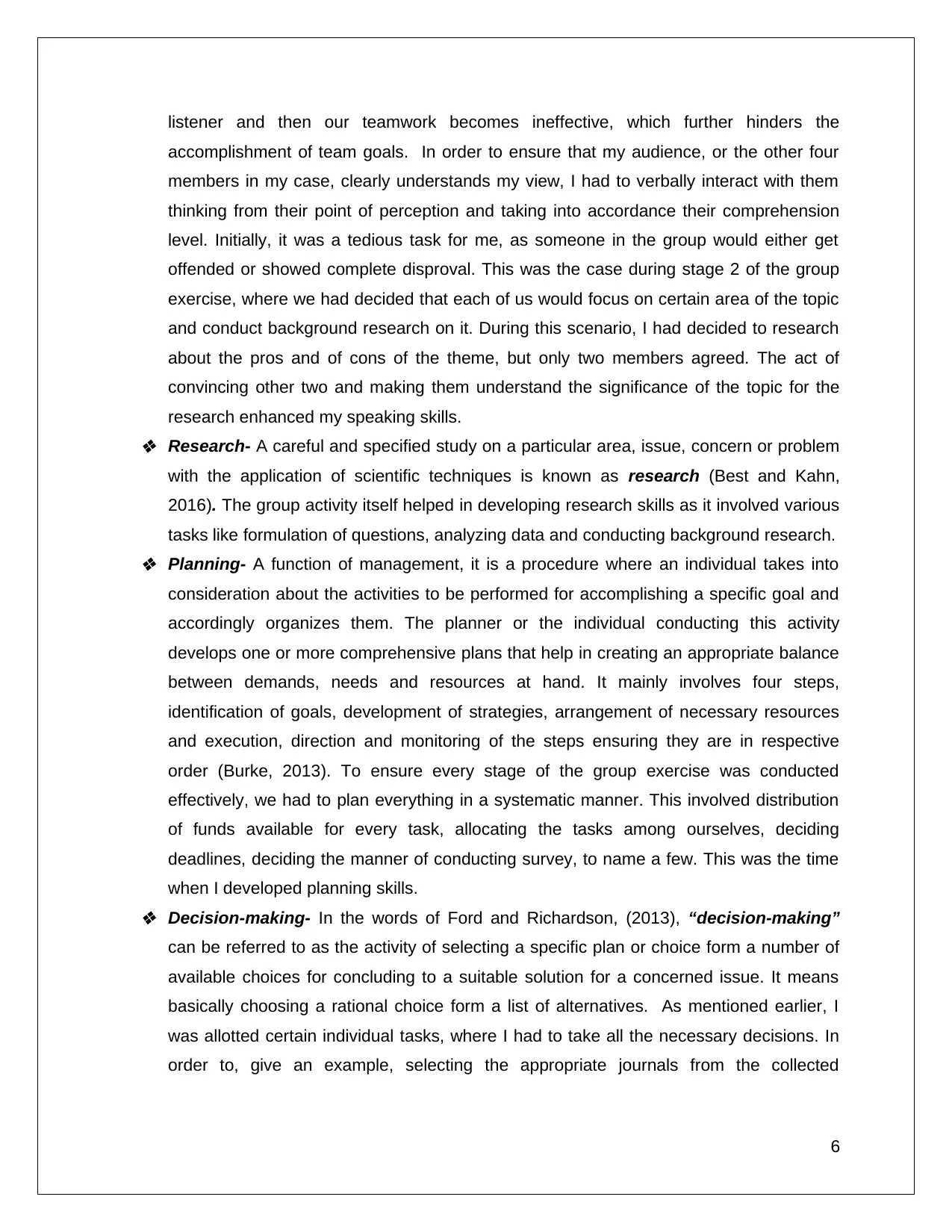
listener and then our teamwork becomes ineffective, which further hinders the
accomplishment of team goals. In order to ensure that my audience, or the other four
members in my case, clearly understands my view, I had to verbally interact with them
thinking from their point of perception and taking into accordance their comprehension
level. Initially, it was a tedious task for me, as someone in the group would either get
offended or showed complete disproval. This was the case during stage 2 of the group
exercise, where we had decided that each of us would focus on certain area of the topic
and conduct background research on it. During this scenario, I had decided to research
about the pros and of cons of the theme, but only two members agreed. The act of
convincing other two and making them understand the significance of the topic for the
research enhanced my speaking skills. Research- A careful and specified study on a particular area, issue, concern or problem
with the application of scientific techniques is known as research (Best and Kahn,
2016). The group activity itself helped in developing research skills as it involved various
tasks like formulation of questions, analyzing data and conducting background research. Planning- A function of management, it is a procedure where an individual takes into
consideration about the activities to be performed for accomplishing a specific goal and
accordingly organizes them. The planner or the individual conducting this activity
develops one or more comprehensive plans that help in creating an appropriate balance
between demands, needs and resources at hand. It mainly involves four steps,
identification of goals, development of strategies, arrangement of necessary resources
and execution, direction and monitoring of the steps ensuring they are in respective
order (Burke, 2013). To ensure every stage of the group exercise was conducted
effectively, we had to plan everything in a systematic manner. This involved distribution
of funds available for every task, allocating the tasks among ourselves, deciding
deadlines, deciding the manner of conducting survey, to name a few. This was the time
when I developed planning skills. Decision-making- In the words of Ford and Richardson, (2013), “decision-making”
can be referred to as the activity of selecting a specific plan or choice form a number of
available choices for concluding to a suitable solution for a concerned issue. It means
basically choosing a rational choice form a list of alternatives. As mentioned earlier, I
was allotted certain individual tasks, where I had to take all the necessary decisions. In
order to, give an example, selecting the appropriate journals from the collected
6
accomplishment of team goals. In order to ensure that my audience, or the other four
members in my case, clearly understands my view, I had to verbally interact with them
thinking from their point of perception and taking into accordance their comprehension
level. Initially, it was a tedious task for me, as someone in the group would either get
offended or showed complete disproval. This was the case during stage 2 of the group
exercise, where we had decided that each of us would focus on certain area of the topic
and conduct background research on it. During this scenario, I had decided to research
about the pros and of cons of the theme, but only two members agreed. The act of
convincing other two and making them understand the significance of the topic for the
research enhanced my speaking skills. Research- A careful and specified study on a particular area, issue, concern or problem
with the application of scientific techniques is known as research (Best and Kahn,
2016). The group activity itself helped in developing research skills as it involved various
tasks like formulation of questions, analyzing data and conducting background research. Planning- A function of management, it is a procedure where an individual takes into
consideration about the activities to be performed for accomplishing a specific goal and
accordingly organizes them. The planner or the individual conducting this activity
develops one or more comprehensive plans that help in creating an appropriate balance
between demands, needs and resources at hand. It mainly involves four steps,
identification of goals, development of strategies, arrangement of necessary resources
and execution, direction and monitoring of the steps ensuring they are in respective
order (Burke, 2013). To ensure every stage of the group exercise was conducted
effectively, we had to plan everything in a systematic manner. This involved distribution
of funds available for every task, allocating the tasks among ourselves, deciding
deadlines, deciding the manner of conducting survey, to name a few. This was the time
when I developed planning skills. Decision-making- In the words of Ford and Richardson, (2013), “decision-making”
can be referred to as the activity of selecting a specific plan or choice form a number of
available choices for concluding to a suitable solution for a concerned issue. It means
basically choosing a rational choice form a list of alternatives. As mentioned earlier, I
was allotted certain individual tasks, where I had to take all the necessary decisions. In
order to, give an example, selecting the appropriate journals from the collected
6
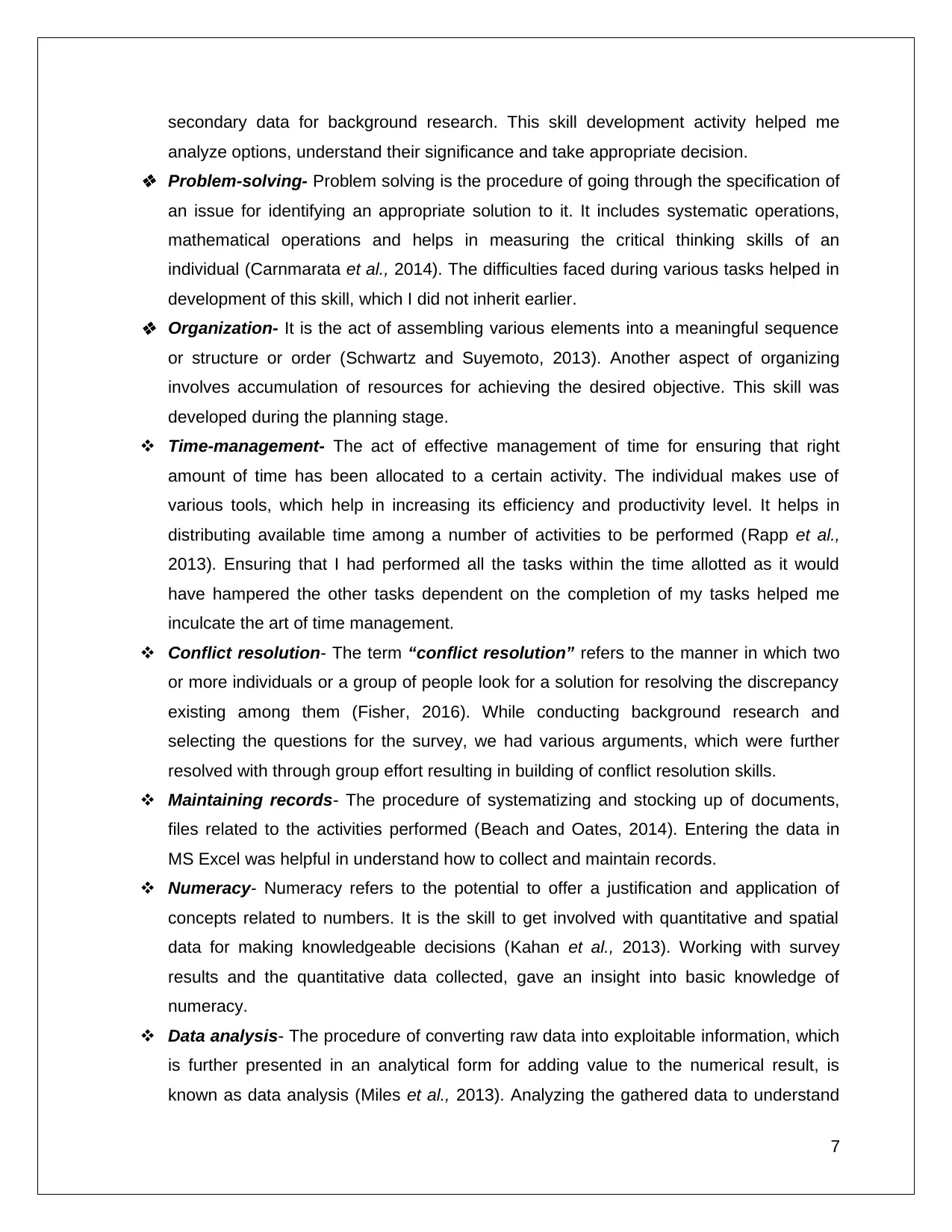
secondary data for background research. This skill development activity helped me
analyze options, understand their significance and take appropriate decision. Problem-solving- Problem solving is the procedure of going through the specification of
an issue for identifying an appropriate solution to it. It includes systematic operations,
mathematical operations and helps in measuring the critical thinking skills of an
individual (Carnmarata et al., 2014). The difficulties faced during various tasks helped in
development of this skill, which I did not inherit earlier. Organization- It is the act of assembling various elements into a meaningful sequence
or structure or order (Schwartz and Suyemoto, 2013). Another aspect of organizing
involves accumulation of resources for achieving the desired objective. This skill was
developed during the planning stage.
Time-management- The act of effective management of time for ensuring that right
amount of time has been allocated to a certain activity. The individual makes use of
various tools, which help in increasing its efficiency and productivity level. It helps in
distributing available time among a number of activities to be performed (Rapp et al.,
2013). Ensuring that I had performed all the tasks within the time allotted as it would
have hampered the other tasks dependent on the completion of my tasks helped me
inculcate the art of time management.
Conflict resolution- The term “conflict resolution” refers to the manner in which two
or more individuals or a group of people look for a solution for resolving the discrepancy
existing among them (Fisher, 2016). While conducting background research and
selecting the questions for the survey, we had various arguments, which were further
resolved with through group effort resulting in building of conflict resolution skills.
Maintaining records- The procedure of systematizing and stocking up of documents,
files related to the activities performed (Beach and Oates, 2014). Entering the data in
MS Excel was helpful in understand how to collect and maintain records.
Numeracy- Numeracy refers to the potential to offer a justification and application of
concepts related to numbers. It is the skill to get involved with quantitative and spatial
data for making knowledgeable decisions (Kahan et al., 2013). Working with survey
results and the quantitative data collected, gave an insight into basic knowledge of
numeracy.
Data analysis- The procedure of converting raw data into exploitable information, which
is further presented in an analytical form for adding value to the numerical result, is
known as data analysis (Miles et al., 2013). Analyzing the gathered data to understand
7
analyze options, understand their significance and take appropriate decision. Problem-solving- Problem solving is the procedure of going through the specification of
an issue for identifying an appropriate solution to it. It includes systematic operations,
mathematical operations and helps in measuring the critical thinking skills of an
individual (Carnmarata et al., 2014). The difficulties faced during various tasks helped in
development of this skill, which I did not inherit earlier. Organization- It is the act of assembling various elements into a meaningful sequence
or structure or order (Schwartz and Suyemoto, 2013). Another aspect of organizing
involves accumulation of resources for achieving the desired objective. This skill was
developed during the planning stage.
Time-management- The act of effective management of time for ensuring that right
amount of time has been allocated to a certain activity. The individual makes use of
various tools, which help in increasing its efficiency and productivity level. It helps in
distributing available time among a number of activities to be performed (Rapp et al.,
2013). Ensuring that I had performed all the tasks within the time allotted as it would
have hampered the other tasks dependent on the completion of my tasks helped me
inculcate the art of time management.
Conflict resolution- The term “conflict resolution” refers to the manner in which two
or more individuals or a group of people look for a solution for resolving the discrepancy
existing among them (Fisher, 2016). While conducting background research and
selecting the questions for the survey, we had various arguments, which were further
resolved with through group effort resulting in building of conflict resolution skills.
Maintaining records- The procedure of systematizing and stocking up of documents,
files related to the activities performed (Beach and Oates, 2014). Entering the data in
MS Excel was helpful in understand how to collect and maintain records.
Numeracy- Numeracy refers to the potential to offer a justification and application of
concepts related to numbers. It is the skill to get involved with quantitative and spatial
data for making knowledgeable decisions (Kahan et al., 2013). Working with survey
results and the quantitative data collected, gave an insight into basic knowledge of
numeracy.
Data analysis- The procedure of converting raw data into exploitable information, which
is further presented in an analytical form for adding value to the numerical result, is
known as data analysis (Miles et al., 2013). Analyzing the gathered data to understand
7
Paraphrase This Document
Need a fresh take? Get an instant paraphrase of this document with our AI Paraphraser
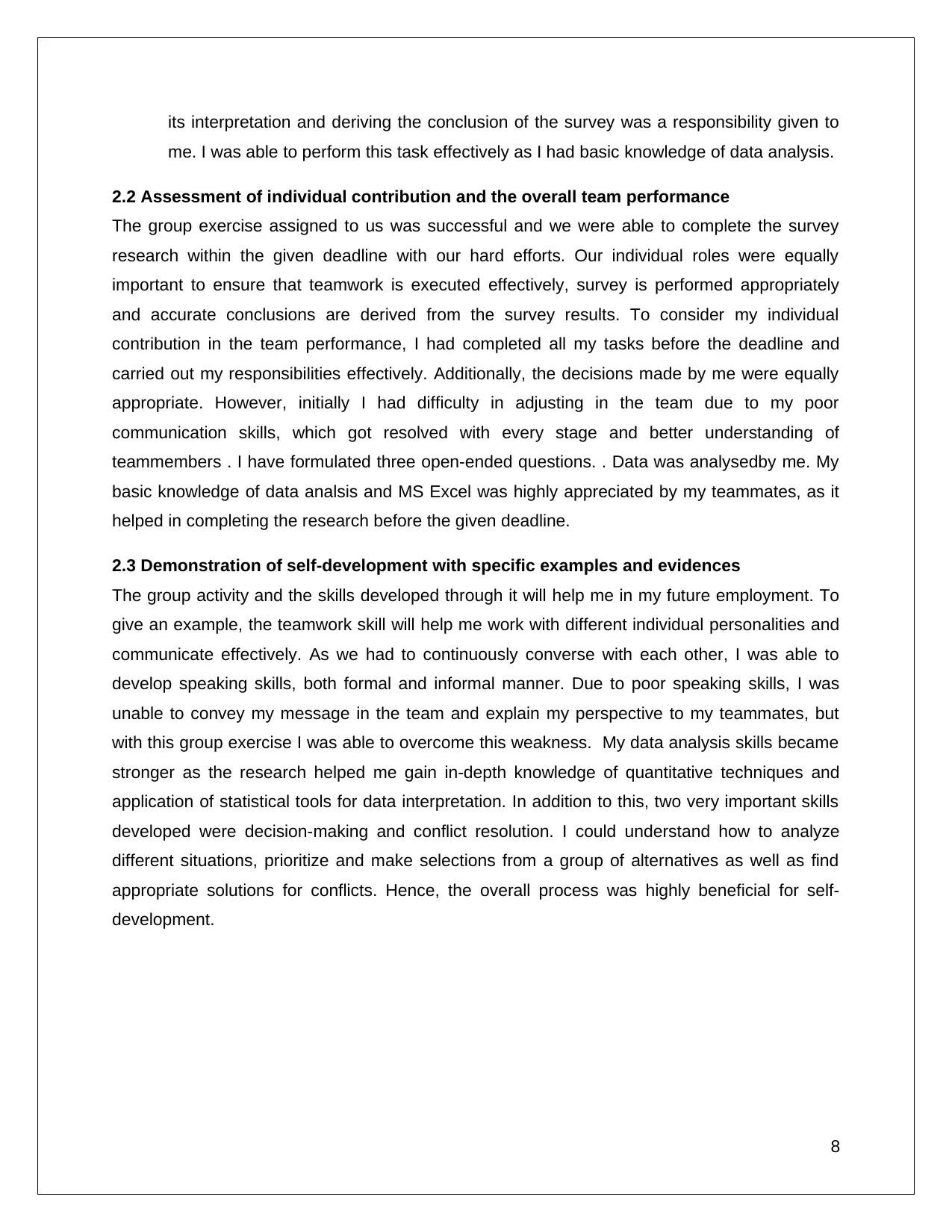
its interpretation and deriving the conclusion of the survey was a responsibility given to
me. I was able to perform this task effectively as I had basic knowledge of data analysis.
2.2 Assessment of individual contribution and the overall team performance
The group exercise assigned to us was successful and we were able to complete the survey
research within the given deadline with our hard efforts. Our individual roles were equally
important to ensure that teamwork is executed effectively, survey is performed appropriately
and accurate conclusions are derived from the survey results. To consider my individual
contribution in the team performance, I had completed all my tasks before the deadline and
carried out my responsibilities effectively. Additionally, the decisions made by me were equally
appropriate. However, initially I had difficulty in adjusting in the team due to my poor
communication skills, which got resolved with every stage and better understanding of
teammembers . I have formulated three open-ended questions. . Data was analysedby me. My
basic knowledge of data analsis and MS Excel was highly appreciated by my teammates, as it
helped in completing the research before the given deadline.
2.3 Demonstration of self-development with specific examples and evidences
The group activity and the skills developed through it will help me in my future employment. To
give an example, the teamwork skill will help me work with different individual personalities and
communicate effectively. As we had to continuously converse with each other, I was able to
develop speaking skills, both formal and informal manner. Due to poor speaking skills, I was
unable to convey my message in the team and explain my perspective to my teammates, but
with this group exercise I was able to overcome this weakness. My data analysis skills became
stronger as the research helped me gain in-depth knowledge of quantitative techniques and
application of statistical tools for data interpretation. In addition to this, two very important skills
developed were decision-making and conflict resolution. I could understand how to analyze
different situations, prioritize and make selections from a group of alternatives as well as find
appropriate solutions for conflicts. Hence, the overall process was highly beneficial for self-
development.
8
me. I was able to perform this task effectively as I had basic knowledge of data analysis.
2.2 Assessment of individual contribution and the overall team performance
The group exercise assigned to us was successful and we were able to complete the survey
research within the given deadline with our hard efforts. Our individual roles were equally
important to ensure that teamwork is executed effectively, survey is performed appropriately
and accurate conclusions are derived from the survey results. To consider my individual
contribution in the team performance, I had completed all my tasks before the deadline and
carried out my responsibilities effectively. Additionally, the decisions made by me were equally
appropriate. However, initially I had difficulty in adjusting in the team due to my poor
communication skills, which got resolved with every stage and better understanding of
teammembers . I have formulated three open-ended questions. . Data was analysedby me. My
basic knowledge of data analsis and MS Excel was highly appreciated by my teammates, as it
helped in completing the research before the given deadline.
2.3 Demonstration of self-development with specific examples and evidences
The group activity and the skills developed through it will help me in my future employment. To
give an example, the teamwork skill will help me work with different individual personalities and
communicate effectively. As we had to continuously converse with each other, I was able to
develop speaking skills, both formal and informal manner. Due to poor speaking skills, I was
unable to convey my message in the team and explain my perspective to my teammates, but
with this group exercise I was able to overcome this weakness. My data analysis skills became
stronger as the research helped me gain in-depth knowledge of quantitative techniques and
application of statistical tools for data interpretation. In addition to this, two very important skills
developed were decision-making and conflict resolution. I could understand how to analyze
different situations, prioritize and make selections from a group of alternatives as well as find
appropriate solutions for conflicts. Hence, the overall process was highly beneficial for self-
development.
8
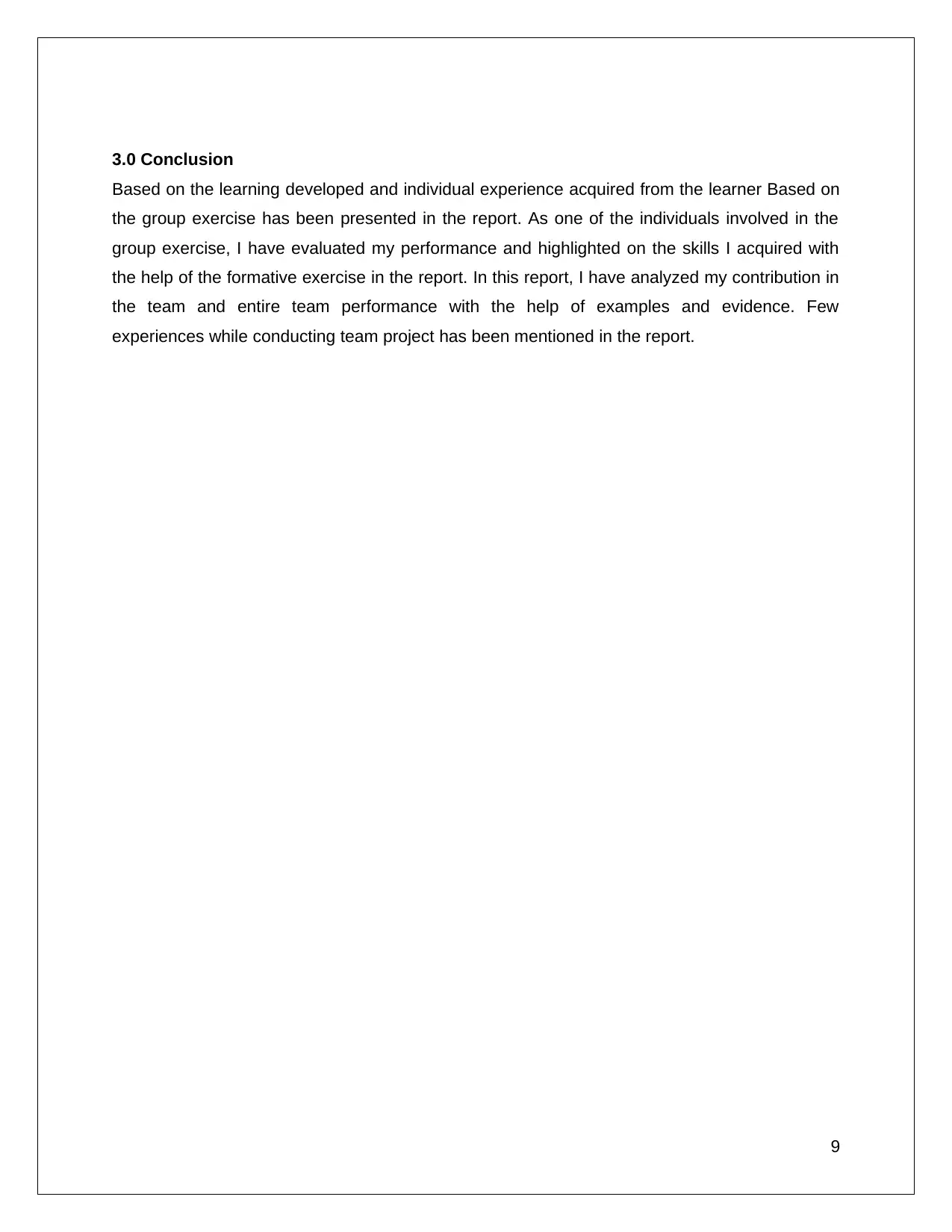
3.0 Conclusion
Based on the learning developed and individual experience acquired from the learner Based on
the group exercise has been presented in the report. As one of the individuals involved in the
group exercise, I have evaluated my performance and highlighted on the skills I acquired with
the help of the formative exercise in the report. In this report, I have analyzed my contribution in
the team and entire team performance with the help of examples and evidence. Few
experiences while conducting team project has been mentioned in the report.
9
Based on the learning developed and individual experience acquired from the learner Based on
the group exercise has been presented in the report. As one of the individuals involved in the
group exercise, I have evaluated my performance and highlighted on the skills I acquired with
the help of the formative exercise in the report. In this report, I have analyzed my contribution in
the team and entire team performance with the help of examples and evidence. Few
experiences while conducting team project has been mentioned in the report.
9
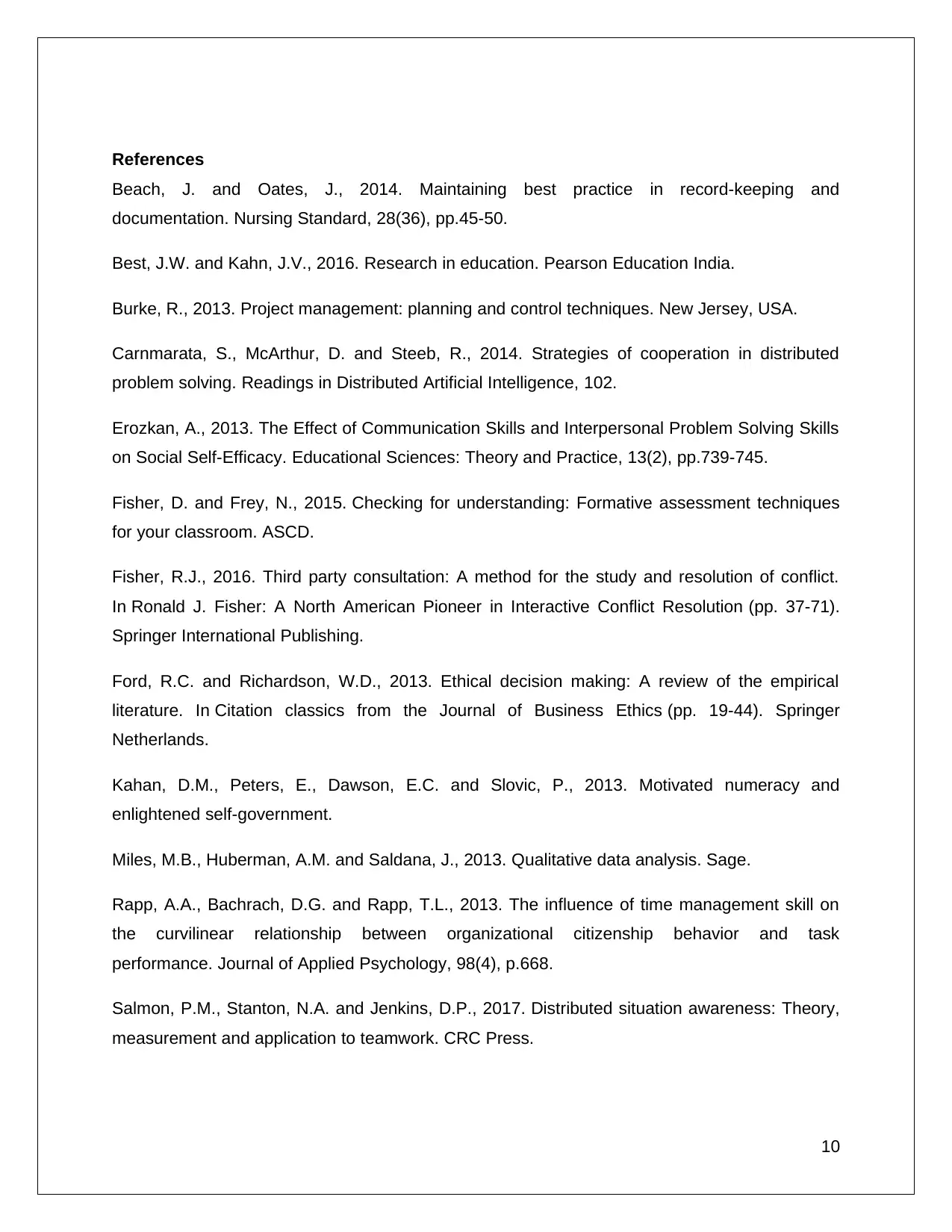
References
Beach, J. and Oates, J., 2014. Maintaining best practice in record-keeping and
documentation. Nursing Standard, 28(36), pp.45-50.
Best, J.W. and Kahn, J.V., 2016. Research in education. Pearson Education India.
Burke, R., 2013. Project management: planning and control techniques. New Jersey, USA.
Carnmarata, S., McArthur, D. and Steeb, R., 2014. Strategies of cooperation in distributed
problem solving. Readings in Distributed Artificial Intelligence, 102.
Erozkan, A., 2013. The Effect of Communication Skills and Interpersonal Problem Solving Skills
on Social Self-Efficacy. Educational Sciences: Theory and Practice, 13(2), pp.739-745.
Fisher, D. and Frey, N., 2015. Checking for understanding: Formative assessment techniques
for your classroom. ASCD.
Fisher, R.J., 2016. Third party consultation: A method for the study and resolution of conflict.
In Ronald J. Fisher: A North American Pioneer in Interactive Conflict Resolution (pp. 37-71).
Springer International Publishing.
Ford, R.C. and Richardson, W.D., 2013. Ethical decision making: A review of the empirical
literature. In Citation classics from the Journal of Business Ethics (pp. 19-44). Springer
Netherlands.
Kahan, D.M., Peters, E., Dawson, E.C. and Slovic, P., 2013. Motivated numeracy and
enlightened self-government.
Miles, M.B., Huberman, A.M. and Saldana, J., 2013. Qualitative data analysis. Sage.
Rapp, A.A., Bachrach, D.G. and Rapp, T.L., 2013. The influence of time management skill on
the curvilinear relationship between organizational citizenship behavior and task
performance. Journal of Applied Psychology, 98(4), p.668.
Salmon, P.M., Stanton, N.A. and Jenkins, D.P., 2017. Distributed situation awareness: Theory,
measurement and application to teamwork. CRC Press.
10
Beach, J. and Oates, J., 2014. Maintaining best practice in record-keeping and
documentation. Nursing Standard, 28(36), pp.45-50.
Best, J.W. and Kahn, J.V., 2016. Research in education. Pearson Education India.
Burke, R., 2013. Project management: planning and control techniques. New Jersey, USA.
Carnmarata, S., McArthur, D. and Steeb, R., 2014. Strategies of cooperation in distributed
problem solving. Readings in Distributed Artificial Intelligence, 102.
Erozkan, A., 2013. The Effect of Communication Skills and Interpersonal Problem Solving Skills
on Social Self-Efficacy. Educational Sciences: Theory and Practice, 13(2), pp.739-745.
Fisher, D. and Frey, N., 2015. Checking for understanding: Formative assessment techniques
for your classroom. ASCD.
Fisher, R.J., 2016. Third party consultation: A method for the study and resolution of conflict.
In Ronald J. Fisher: A North American Pioneer in Interactive Conflict Resolution (pp. 37-71).
Springer International Publishing.
Ford, R.C. and Richardson, W.D., 2013. Ethical decision making: A review of the empirical
literature. In Citation classics from the Journal of Business Ethics (pp. 19-44). Springer
Netherlands.
Kahan, D.M., Peters, E., Dawson, E.C. and Slovic, P., 2013. Motivated numeracy and
enlightened self-government.
Miles, M.B., Huberman, A.M. and Saldana, J., 2013. Qualitative data analysis. Sage.
Rapp, A.A., Bachrach, D.G. and Rapp, T.L., 2013. The influence of time management skill on
the curvilinear relationship between organizational citizenship behavior and task
performance. Journal of Applied Psychology, 98(4), p.668.
Salmon, P.M., Stanton, N.A. and Jenkins, D.P., 2017. Distributed situation awareness: Theory,
measurement and application to teamwork. CRC Press.
10
Secure Best Marks with AI Grader
Need help grading? Try our AI Grader for instant feedback on your assignments.
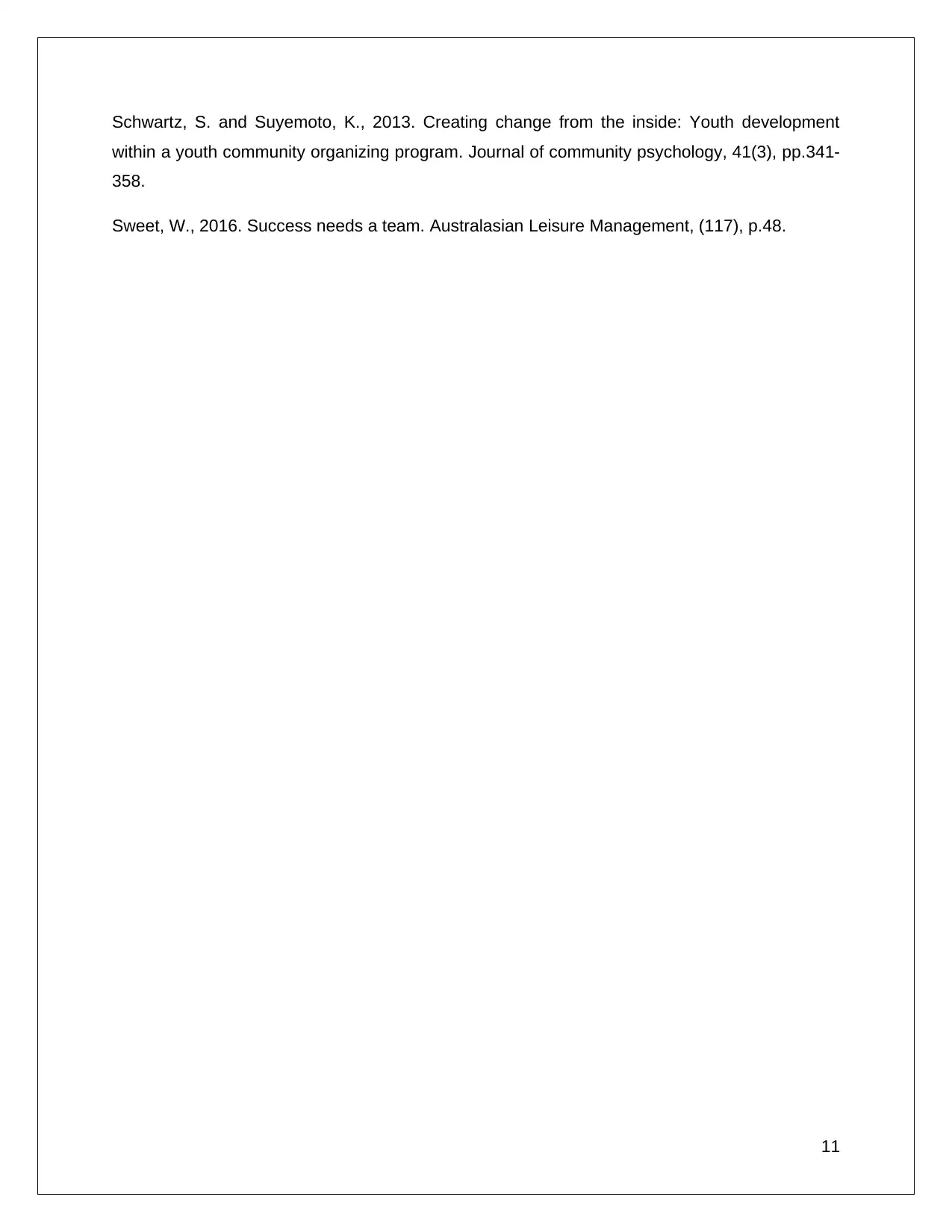
Schwartz, S. and Suyemoto, K., 2013. Creating change from the inside: Youth development
within a youth community organizing program. Journal of community psychology, 41(3), pp.341-
358.
Sweet, W., 2016. Success needs a team. Australasian Leisure Management, (117), p.48.
11
within a youth community organizing program. Journal of community psychology, 41(3), pp.341-
358.
Sweet, W., 2016. Success needs a team. Australasian Leisure Management, (117), p.48.
11
1 out of 11
Related Documents
Your All-in-One AI-Powered Toolkit for Academic Success.
+13062052269
info@desklib.com
Available 24*7 on WhatsApp / Email
![[object Object]](/_next/static/media/star-bottom.7253800d.svg)
Unlock your academic potential
© 2024 | Zucol Services PVT LTD | All rights reserved.





